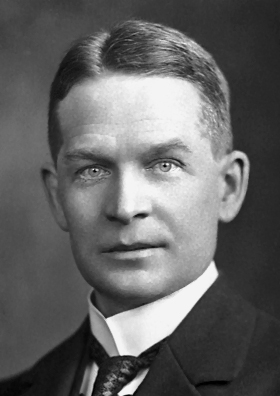古代核戦争>関連情報
Frederick Soddy(1877-1956)は、1921年に原子核崩壊の研究、特に同位体理論に対してノーベル化学賞を受賞したイギリスの放射線化学者である。彼の1909年の著作The Interpretation of Radiumの最後の章に記述は、「古代核戦争」に言及したものとして引用されることがあるが、実際には何も言っていない。
"By a single mistake"からの記述が、古代核戦争を指していることにされただけである。
Frederick Soddy(1877-1956)は、1921年に原子核崩壊の研究、特に同位体理論に対してノーベル化学賞を受賞したイギリスの放射線化学者である。彼の1909年の著作The Interpretation of Radiumの最後の章に記述は、「古代核戦争」に言及したものとして引用されることがあるが、実際には何も言っていない。
[ wikimedia commons ] It is curious how strangely some of the old myths and legends about matter and man appear in the light of the recent knowledge. Consider, for example, the ancient mystic symbol of matter, known as Ouroboros—" the tail devourer "—which was a serpent, coiled into a circle with the head devouring the tail, and bearing the central motto " The whole is one." This symbolises evolution, moreover it is evolution in cycle—the latest possi bility—and stranger still it is evolution of matter— again the very latest aspect of evolution—the existence of which was strenuously denied by Clerk Maxwell and others of only last century. The idea which arises in one's mind as the most attractive and consistent explanation of the universe in light of present knowledge, is perhaps that matter is breaking down and its energy being evolved and degraded in one part of a cycle of evolution, and in another part still unknown to us, the matter is being again built up with the utilisation of the waste energy. The consequence would be that, in spite of the incessant changes, an equilibrium con dition would result, and continue indefinitely. If one wished to symbolise such an idea, in what better way could it be done than by the ancient taildevouring serpent ?
最近の知識の観点に、物質や人間についての古代の神話や伝説が奇妙にも出現することは興味深い。たとえば、物質を指し示す古代の神秘的な象徴であるウロボロスは、頭が尾を噛んで環となった「尾を飲み込む(蛇)」であり、「全であり一である」という中心的なモットーを持っている。これは進化を象徴し、さらに最新の可能性である円環を為した進化であり、いまだ知られざる物質の進化であり、それはまた進化の最新の一面であり、前世紀にClerk Maxwellたちによって強く否定されたものである。この考えは、最近の知識の観点で、最も魅力的で一貫性のある宇宙の説明として、心に思い浮かんだものであり、おそらく進化の円環の一部で、物質は崩壊し、そのエネルギーは進化し劣化し、いまだ知られていない円環の他の部分では、捨てられたエネルギーを再利用して、物質が再構成される。その結果、絶え間ない変化にもかかわらず、平衡状態が生じ、無限に続くことになる。そのような考えを象徴するものとして、古代の「尾を飲み込む(蛇)」以上にふさわしいものがあるだろうか?
Some of the beliefs and legends which have come down to us from antiquity are so universal arid deep-rooted that we are accustomed to consider them almost as old as the race itself. One is tempted to inquire how far the unsuspected aptness of some of these beliefs and sayings to the point of view so recently disclosed is the result of mere chance or coincidence, and how far it may be evidence of a wholly unknown and unsuspected ancient civilisation of which all other relic has disappeared. It was curious to reflect, for example, upon the remarkable legend of the philosopher's stone, one of the oldest and most universal beliefs, the origin of which, however far back we penetrate into the records of the past, we do not seem to be able to trace to its source. The philosopher's stone was accredited the power not only of transmuting the metals, but of acting as the elixir of life. Now, whatever the origin of this apparently meaningless jumble of ideas may have been, it is really a perfect and but very slightly allegorical expression of the actual present views we hold today. It does not require much effort of the imagination to see in energy the life of the physical universe, and the key to the primary fountains of the physical life of the universe today is known to be transmutation. Was then this old association of the power of transmutation with the elixir of life merely a coincidence ? I prefer to believe it may be an echo from one of many previous epochs in the unrecorded history of the world, of an age of men which have trod before the road we are treading today, in a past possibly so remote that even the very atoms of its civilisation literally have had time to disintegrate.
古代から我々に伝承されてきた信念や伝説のいくつかは、とても普遍的で根深いものであり、我々はそれらを人種そのものと同じくらい古くからあるものだが考えるようになっている。これらの信念や伝承のいくつかが、最近の知識の観点で適切であることが、いかほど偶然の産物であるか問いたくなるだろう。あるいは、すべての遺物が失われた、まったく未知の思いもよらぬ古代文明の証拠かもしれないと考えたくなるだろう。たとえば、最も古く最も普遍的な信念の一つである賢者の石の注目すべき伝説を反映するのは興味深い。しかしながら、その起源は過去の記録をどこまでたどっても、起源には遡れそうにない。賢者の石には金属を変容させ、生命のエリクサーとして役割を果たす力があると考えられてきた。この一見無意味な考えの起源が何であるにせよ、それは我々が今日持っている現在の知識を本当に完全かつ、少し寓意的に表現している。エネルギーが物理世界の生命であり、今日、変容として知られる物理的生命の主たる泉への鍵であると考えるのに、労を要しない。変容の力と生命のエリクサーを関連付ける古代の伝承は、偶然だろうか? 私はこれを、記録されざる世界史の過去の多くの世紀のひとつ、我々が歩んでいる道をかつて歩んだ人々の時代、その文明の原子が文字通り崩壊するほどの過去からの、残響だと信じたい。
Let us give the imagination a moment's further free scope in this direction, however, before closing. What if this point of view that has now suggested itself is true, and we may trust ourselves to the slender foundation afforded by the traditions and superstitions which have been handed down to us from a prehistoric time ? Can we not read into them some justification for the belief that some former forgotten race of men attained not only to the knowledge we have so recently won, but also to the power that is not yet ours ? Science has reconstructed the story of the past as one of a continuous Ascent of Man to the present-day level of his powers. In face of the circumstantial evidence existing of this steady upward progress of the race, the traditional view of the Fall of Man from a higher former state has come to be more and more difficult to understand. From our new standpoint the two points of view are by no means so irreconcilable as they appeared. A race which could transmute matter would have little need to earn its bread by the sweat of its brow. If we can judge from what our engineers accomplish with their comparatively restricted supplies of energy, such a race could transform a desert continent, thaw the frozen poles, and make the whole world one smiling Garden of Eden. Possibly they could explore the outer realms of space, emigrating to more favourable worlds as the superfluous today emigrate to more favourable continents. One can see also that such dominance may well have been short-lived. By a single mistake, the relative positions of Nature and man as servant and master would, as now, become reversed, but with infinitely more disastrous consequences, so that even the whole world might be plunged back again under the undisputed sway of Nature, to begin once more its upward toilsome journey through the ages. The legend of the Fall of Man possibly may indeed be the story of such a past calamity.
話を終える前に、もう少し想像の翼を広げてみよう。この見方が正しく、有史以前から伝承されてきた伝統と迷信によってもたらされた、わずかな基礎を信頼できるとしたらどうだろうか? 我々が最近到達した知識のみならず、我々の手がまだ届いていない力をも持っていた、忘却された人種がいたという考えを正当化できないだろうか? 科学は過去を、現在の力のレベルへと歩む人類の進歩として再構成した。恒常的な進歩の歩みに既存の状況証拠に直面すれば、高い状態からの人類の堕落を想像することは困難になってきている。我々の新たな立場からすれば、2つの見方は相いれないように見える。物質を転換する力を持つ人種であれば、額に汗してパンを得る必要はないだろう。限定的なエネルギー供給のもとで、我々の技術者たちが達成したことから判断するなら、そのような人種は砂漠の大陸を変容させ、極冠を融かし、世界をエデンの園に変えていただろう。我々が住みよい大陸へ移住するように、彼らは外宇宙を探検し、住みよい世界へ移住したかもしれない。そのような優位な人種は短命だったかもしれない。たった一つの過ちで、人間が主人で自然が奴隷だという関係が逆転し、無限に悲惨な結果を招いたかもしれない。そして自然のまごうことなき揺らぎによって、全世界さえものが転落し、時代を越えて、再び、やっかいな進歩の歩みを始めたかもしれない。人間の堕落の伝説は、そのような過去の災厄の物語だったのかもしれない。
[ Frederick Soddy, M.A.: "The Interpretation of Radium", 1909, pp241-245 ]
"By a single mistake"からの記述が、古代核戦争を指していることにされただけである。



コメントをかく